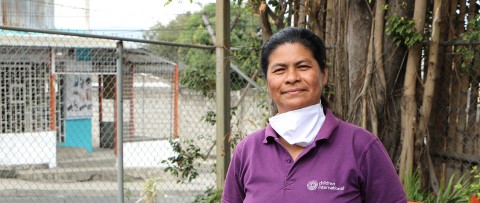- Global Perspectives
- Dominican Republic

The ongoing coronavirus pandemic has led to a global sense of uncertainty. For some, it’s the fear of the virus itself – whether that means getting sick or losing a loved one to the illness. But for Yalile, a volunteer mother in Guayaquil, Ecuador, this crisis has caused severe mental health struggles, like anxiety and depression – at times so extreme she could hardly get out of bed.
“At home, we had difficult times, I felt a lot of stress and I could not concentrate,” Yalile explains. “I had dizziness, pressure in my chest. I didn’t feel capable of doing anything. There were days I couldn’t even get out of bed.”
With two children, Suley, 18, a sponsored youth, and Derek, 7 –Yalile’s fears continued to grow as her husband lost his job and no immediate solution to the virus was available. She was unable to help her son Derek with his virtual classes, a burden that many of our sponsored families are still learning how to navigate. Without an education themselves, it can be difficult for parents living in poverty to help children with the support they need to be successful learning at home.

Combining the pressure of teaching at home with the worsening stress of the pandemic, Yalile’s anxiety continued to grow. Until finally, she turned to Children International and the telehealth services we have provided to sponsored children and families since the earliest days of the virus this past spring.
Medical staff listened to her worries and gave her advice about how she could process the challenges of the crisis, including changes she could make in her diet, as well as some vitamins she could take to begin feeling more like herself. The teachers also heard the challenges Yalile faced with Derek’s education and began to send videos with instructions, which helped both Derek and Yalile complete lessons at home.
Children International staff around the world has begun to pivot the programs we offer to meet the needs of this crisis. In partnership with Turning Point and the University of Kansas Health System, staff has designed and piloted an emotional wellness program that teaches resilience in Jalisco, Mexico, and Kolkata, India, for the last two years. We were able to launch this virtual curriculum globally by the end of June 2020.
Shweta Verma, Sr.Technical Officer-Social and Behavior Change Communication, describes the focus of the program:

Under normal circumstances, the program is preventive in nature and is implemented though six face-to-face sessions that last about two hours each. Since the coronavirus has altered programming, staff uses WhatsApp to deliver program content to participants remotely. Our teams send activities via video message or written text, and families follow-up with their own video response after they’ve completed the assignments.
The program focuses on 10 facets designed to help participants fully process their life experiences, both positive and negative.

The support of sponsors and donors through our Emergency Community Fund has helped this program grow. The fund is one of our special interventions and it’s been a critical source of help for already-struggling families in poverty.
As for Yalile, through the support from doctors, the progress of her children’s classes, and the virtual support of her fellow volunteer mothers, her spirit began to reappear, little by little.
“During the time when I felt so bad, I received a lot of support from the coordinator of my community center and from my fellow volunteers: financial and moral support. They made me see that my children depend on my help [and that] I am a strong person. I continuously received calls from Children International staff. They never abandoned me.”
Comments
You must be logged in to comment. If you have an account, click here to log in.